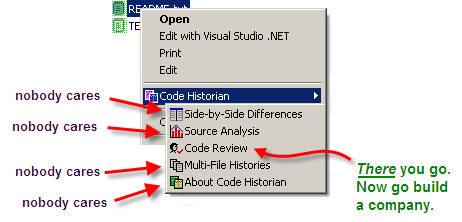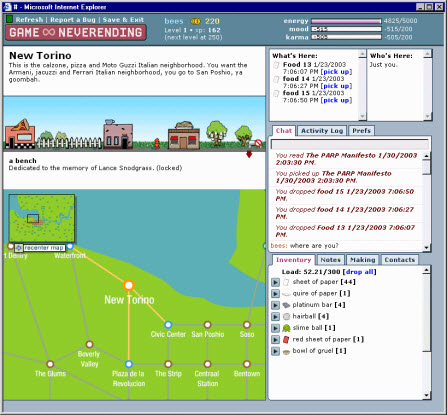“My idea isn’t good enough yet” explained a friend who is thinking of starting his own company. He’s waiting for the idea to be completely fleshed out before taking the leap.
Newsflash: Your idea probably sucks, and it doesn’t matter because your business will probably turn out to be something completely different.
Sounds wrong? Let’s see.
 In 1998, a company received $4.8 million in funding to “beam money between Palm Pilots.” I’ll code-name this product: MoneyBeamer.
In 1998, a company received $4.8 million in funding to “beam money between Palm Pilots.” I’ll code-name this product: MoneyBeamer.
Here’s the pitch. Alice wants to give Bob some money, but Alice doesn’t have cash or her checkbook. There’s no ATM around. Both Alice and Bob do own palm pilots and they both previously installed MoneyBeamer and, despite having forgotten all their normal modes of money transfer, they did remember to bring their palm pilots. MoneyBeamer will allow Alice to send money to Bob. Well actually it won’t, but it will remember that Alice wants to send Bob money, and once Alice gets back home and connects her Palm Pilot with her computer, and after she dials up to the Internet, MoneyBeamer will contact a server and transfer the money, provided of course that Alice has the money and didn’t secretly change her mind in the meantime.
Would you have invested in them? Not with an idea like that. You’d be wrong though — it was PayPal. Their work with encryption combined with an idea for a consumer-targeted on-line banking system made it the easiest way to send money… by email. They were sold to eBay for $1.3 billion. Today they process $2,000 of payments every second.
….
I’m sure you won’t recognize this web-based sensation:
This is Game Neverending: An in-browser multi-player on-line game “with no way to win, nor any definition of success.” (Sounds like a lot of Web 2.0 companies to me.) It never saw the light of day.
What was most interesting (to its alpha testers) was that people could share game objects by dragging them into chat windows. They saw this as a useful enhancement to chat applications in general, so as plans for the game fizzled out the engineers created a Flash application for real-time chat plus file-sharing with a particular emphasis on image-sharing.
Unfortunately the Flash application was only real-time — your pictures didn’t stick around when you closed it. And this was fatal because it turns out people were interested in the sharing part more than the real-time part. So in yet another upheaval they rewrote the Flash application as a regular website and lo, Flickr was born. Now it’s the largest photo-sharing site in the world with 3 billion photos and 5,000 more uploaded every minute.
….
Of course a rant like this wouldn’t be complete without self-deprecation, so let’s accompany the Ghost of Christmas Past into the annals of my own company, Smart Bear. My first idea was a product called Code Historian; it could dig through the history of a file and show you what changed. Accurate name, but turns out to be almost useless.
Like an adolescent, the company went through many embarrassing stages (forgive the broken images, ’tis the way of the Way Back Machine):
- Mar 24, 2003: Hideous. “Do one thing and do it poorly.”
- Dec 22, 2003: Fugly. “Three products… is that enough for a Suite?”
- Oct 10, 2004: Lame. “Everything above the fold, most expensive first.”
- Jan 11, 2006: Getting there. “You really need a graphic designer. No, really.”
- Sep 10, 2007: Ain’t bad. “At least you admit ‘code review’ is all that matters.”
- Present day: Nice. “Hey, where did those other products go?”
At one point we were selling six different tools; the only one that mattered in the end was Code Reviewer. Perhaps a screenshot will make this clear:

The point of all this isn’t to berate anyone for their crappy ideas. In fact, just the opposite — the point is that it doesn’t matter what your first idea is. First, it’s probably wrong. Second, the only way to find the right one is to try the wrong one and see what happens. You won’t find it by fiddling around with PowerPoint slides and Photoshop mock-ups.
So get out there and make some mistakes! As Neil Davidson said recently:
You don’t need stratospheric growth and a billion-dollar addressable market to bootstrap a software company. A $50,000 market opportunity is enough to get you off the ground — once you get started you’ll figure out the rest.
(Neil is the co-founder of Red Gate. It started as yet-another-online-bug-tracking-system that no one cared about but is now a popular purveyor of fine SQL database tools with 95,000 customers to their credit.)
Do you have stories of bad ideas leading to good results? Have you seen an idea succeed without changing? Leave a comment!

52 responses to “Your idea sucks, now go do it anyway”
Truly an inspirational post!!! That sound you hear is the standing ovation you’re getting from me right now!!!
Hi Jason – this is an awesome post. I had no idea that Flickr started out as a completely different company. I’m certainly with you on just trying things to see if they work. Not everything is going to be a huge success – but you can certainly learn from everything you try.
I lost a lot of money in a business I started earlier in the year. But it was the wrong business from me and I learned a lot of stuff that will benefit me later on.
I love reading one post and have it be enough for me to decide to subscribe. This is such a necessary message for newbies to hear. We all need to scream it out to them often. Perfectionism is an impossibility. Good enough is good enough – go!
Thank you for this post. I started a company a couple of months ago and recently realized that my initial plan might not work as well as I thought. I have some new ideas and I hope to switch gears after the holidays.
Thanks for a great post making an incredibly important point.It brought inspiration to me right when I needed it.
My eBay frontend, AuctionSieve, was like that.
I wanted a tool to record the price history of auctions. As a side thing, I was going through lots of auctions on eBay and wanted to cut down on my time spent doing that so I hacked together some scripts to filter the eBay search results. Then I got tired of managing the kill file list and had the idea of being able to just select text with the mouse and hit a ‘kill’ button. That’s how AuctionSieve was born.
And furthermore, version one didn’t even allow you to do eBay searches! It just grabbed entire eBay categories. Search came in version 1.1.
It’s interesting to see how Flickr started and how web services can start out as one thing but turn into another.
Waiting to see what Workpost.com will become…
Any suggestions?
Awesome post… the world overvalues perfection, and it’s amazing how many great things never get started because of it.
@Dale Thanks! I like what you said about perfection. It’s incredible just how imperfect everything can be successful. I feel like that all the time at Smart Bear — everywhere I look things "could be better," but it ends up not mattering.
So far I have started 2 businesses and they are both back in the folder because the 1st versions didn’t work out. Now I’m on my 3rd idea and so far stuff is looking up. But starting those other businesses that haven’t worked out have led to this new idea. So it was great to try those ideas and even if they never come back maybe what they have led to will do something special.
@Jared — That’s the right attitude! It can be depressing to see things "fail," but in failure is learning and growth. They say you learn more from failures than from successes. In fact it’s bad to find someone with only successes because they can’t recognize when failure is imminent and change course!
Definitely inspirational. I’m gonna go start drinking and blogging and see what happens.
Excellent Post, the problem is that, as you say things just don’t work out how you would expect.
Thanks again, i really enjoyed your blog
Mike
Firstly, great post. I was listening to a talk put on by Dharmesh Shah of HubSpot and OnStartups.com and he said pretty much the same thing. It’s not about the idea it’s about diving in and making something happen.
Secondly, I had no idea your software existed, but I feel like I have been searching for it for years. I had contemplated writing exactly the software you have written. You really need to get the word out. If you login to stackoverflow.com and search for questions related to your software you could help out a lot of people looking for just what your software offers.
Thanks for the great post!
This reminded me of the experience of many kid programmers who once dreamed of making it big in the Silicon Valley… sorry about that, I just watched a documentary on the History of the Internet :)
http://blogpipiatbingi.com/robert-pattinson-girlfriend-onscreen/
Jumping in will get you into the conversation which will give you more ideas about which way to go with your project.
Jason this post has given me a lot of heart – thanks a million. I have tried so many times to write a ‘business plan’ and found it impossible. It was a total waste of time.
My business is evolving and I’m going to take your timely advice and just do it.
I am building a new web site at the moment. http://www.videosells.com.au if any one wants to comment. Please understand it is under construction. All ideas and thoughts are welcome.
Excellent Post! It gives me inspiration at a much needed time. I’m barreling into a startup that is focused around one of the great pleasures in life – a good sauna! I’m working on a prototype for an all weather, wood burning, mobile tent sauna that you can easily fit in the trunk of your car. There’s only one other company in the world making them in Australia. No idea how they’re doing. Don’t care. Just want to get my project off the ground. It’s all drop ship so it’s relatively low risk/cost to attempt.
Thanks for the extra ooomph to keep going!!
Clint
Interesting idea. I liked it though.
Great post. More proof that you shouldn’t go into business with only one idea, and allow yourself to get attached to it. If you take great ideas and make them happen, you won’t be so disappointed when the universe shoots a few of them down.
More businesses should be willing to allow ideas to fail.
.-= Michael McCracken’s latest blog post: nginx + Passenger: 502 Bad Gateway =-.
I think its dangerous to point to a few well know exceptions and try to pretend it is the rule. The vast majority of startups need a solid idea at its core to have any chance of success.
I think you’re confusing having an idea with being committed to the idea in the face of better ideas.
In all of these examples there WAS a core idea, and the founders believed in it. The point is that you can’t be so married to your original idea that you’re blind to better ideas or blind to the problems with your original idea.
Also this is NOT the exception. Most successful companies of reasonable size (i.e. millions in revenue) became very successful only after breaking with what they original set out to do. Apple, Microsoft, Google, Twitter, Sun, 37signals, FogCreek are all examples. It’s easy to go on and on — it’s not “a few well-known exceptions.”
I think i’d agree with Jason here, almost every VC and Angel who speaks on the matter believes that you must be willing to adapt to what your customers are looking for. This is the principle of a minimally viable product (MVP), don’t bother building features that you think are going to work, but instead build a core set of features that you can change/adapt based on your core users. Sometimes you have to throw your original idea away and go with something else.
1st time here,,, and i cant get enough of your posts….
definately book marking this webby…
my startup was 1st a mobile dating site, then it was a match making service…now its back to been a mobile dating service…lol
.-= kehinde’s latest blog post: 2012 and then he’ll be four =-.
Thanks! Yep you have to fish where the fish are…